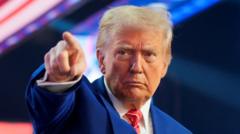In an outspoken speech at the Turning Point USA annual conference in Arizona, former President Donald Trump demanded that Panama either reduce the shipping fees for the Panama Canal or return the canal to U.S. control. This assertion came as Trump claimed that the current tariff prices imposed on American vessels were “ridiculous” and “highly unfair,” describing them as a “complete rip-off” of the United States.
"The fees being charged by Panama will immediately stop," Trump declared to a supportive crowd. His comments drew an immediate response from Panama's President José Raúl Mulino, who defended the nation's sovereignty, stating, “Every square meter of the canal belongs to Panama," emphasizing that the country's independence was non-negotiable.
During his address, Trump referred to the Panama Canal as a “vital national asset” for the U.S., and suggested that if the fees were not promptly reduced, he would demand that the Canal be fully returned to U.S. jurisdiction. This statement reflects a potentially dramatic shift in American foreign policy under Trump's anticipated administration, following his inauguration on January 20.
The Panama Canal, which connects the Atlantic and Pacific oceans and spans 51 miles (82 km), plays a crucial role in global shipping, accommodating approximately 14,000 vessels annually. The canal has been under Panamanian control since 1999, when the U.S. relinquished its hold following a series of treaties beginning in 1977.
In addition to his comments about Panama, Trump also took aim at neighboring countries like Mexico and Canada, criticizing them for what he labeled unfair trade practices. Despite taking a critical stance toward immigration and drug trafficking issues, he praised Mexican President Claudia Sheinbaum as a "wonderful woman."
The conference served as a platform for Trump to reiterate core themes of his political campaign, such as immigration, crime, and international trade, without delving into economic issues like the recently passed Congressional bill focused on keeping the U.S. government funded. Notably, he avoided a direct discussion on raising the national debt ceiling, a proposal he had previously supported.
Trump's address showcased his continued influence over conservative circles and reaffirmed his commitment to some of the controversial positions that characterized his previous tenure in office.

















